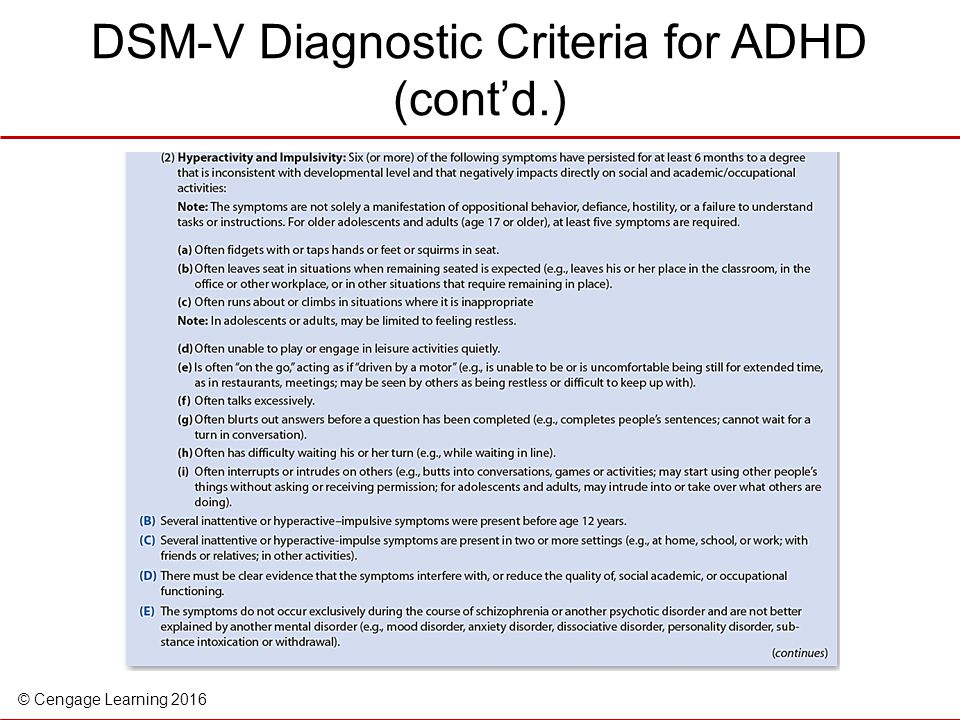Signs of manipulation in relationship
8 Signs Of Emotional Manipulation + What To Do About It
What is manipulation?
In the context of relationships, manipulation refers to actions taken by a person to try to control others, usually in a deceptive or harmful way. Psychological manipulation involves pressure to change behaviors or beliefs by applying deceptive or distorted tactics. Emotional manipulation uses those same tactics to trigger intense emotional reactions deliberately meant to drain another person’s energy or to destabilize their emotional well-being.
Psychologists say the root cause of manipulative behavior can often be toxic cycles of violence, narcissism, or unhealthy relationships in the manipulator’s own childhood.
Manipulation can happen in any relational context, Balestrieri says, including family, friends, professional, romantic, or sexual relationships.
Advertisement
This ad is displayed using third party content and we do not control its accessibility features.
Common signs of manipulation.
1.
You’re doubting your own reality.
Manipulation has many facets, but Balestrieri says one of the most important is gaslighting, which is a conversational tactic designed to “separate you from your gut instinct or logical appraisals of the world.”
McCoy says that if you’re feeling yourself questioning your integrity or “sanity,” that’s a sign that something’s wrong and manipulation may be occurring.
“When you doubt your reality, it makes it easier for a manipulator to convince and persuade you to align with their vision,” Balestrieri continues. “The sole purpose of gaslighting is to separate someone from their own reality and elicit doubt in their minds, or the minds of others, so that the person who is gaslighting can get away with something or retain the upper hand when it comes to the perceived control of others.”
Advertisement
This ad is displayed using third party content and we do not control its accessibility features.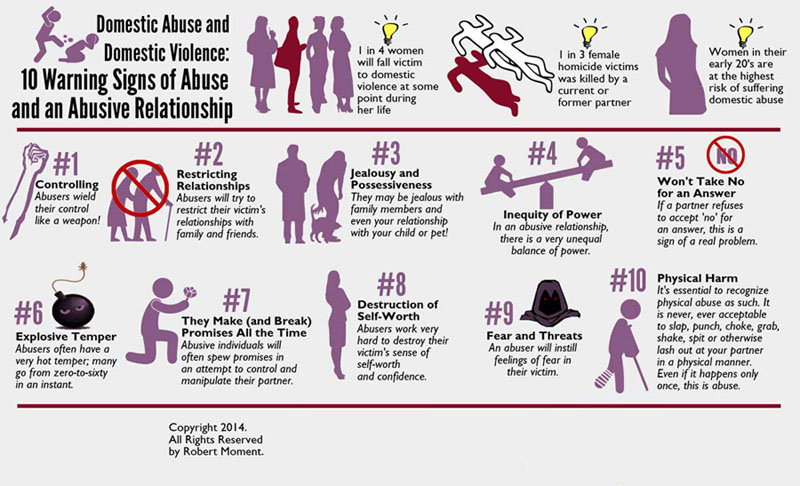
2.
The relationship is very emotionally intense.
Manipulation in romantic relationships often involves facilitating an intense, passionate connection that lays the groundwork for trying to maintain control.
“Love bombing, chaos, and intensity are frequent and foundational elements, necessary for successful manipulation,” Balestrieri explains. “Keeping relational partners confused and disoriented and distracted by fantasies of what is to come or the good times that have happened is a common tactic employed by manipulative and abusive partners.”
3.
You fear abandonment.
“If someone is being manipulated, they may begin to feel uncertainty, fear, or confusion,” McCoy says.
Many victims may dismiss manipulation signs as the normal give and take in a relationship, but McCoy says you can tell the difference between healthy compromise and unhealthy manipulation by whether there’s fear involved. “With compromise, there won't be the thought ‘If I don't do what that person says they are going to leave me or hurt me,’” she says.
If that fear crosses your mind or you feel it in your gut, then chances are you’re being manipulated.
Advertisement
This ad is displayed using third party content and we do not control its accessibility features.
4.
You have a gut feeling that something’s wrong.
“Listening to your gut instinct is essential in assessing manipulation,” Balestrieri explains. “The enteric nervous system, part of the Autonomic Nervous System, lives in our intestines and gut and is responsible for discerning sensory cues and transmitting that information to the brain. Their efforts together are designed to appraise threat, and often this happens outside of our conscious awareness, which we notice as a ‘gut feeling.’”
5.
You feel insecure.
The goal of manipulation is to maintain control over you, and making you feel bad about yourself can be one way manipulators exert their power over you and keep you complacent. “They use your weakness against you,” Balestrieri explains. “When you are vulnerable, they weaponize your fears and insecurities to feel superior.”
“When you are vulnerable, they weaponize your fears and insecurities to feel superior.”
Advertisement
This ad is displayed using third party content and we do not control its accessibility features.
6.
They want you to depend on them and only them.
If you have no one else to turn to, it’s easier for the manipulator to control you. That’s why attempts at isolation or extreme codependence can be a sign of manipulation. “They attempt to isolate you (physically, socially, and financially) and try to engender dependence on them,” Balestrieri explains. “Limiting your resources and outside influences gives them control.”
7.
They keep comparing you to others.
Comparing you to others can be a form of manipulation, according to Balestrieri. "Manipulative people thrive on the idea that people will compete for them,” she explains. “Constant comparison to others can be a form of manipulation, as it is designed to evoke feelings of inadequacy and competition. ”
”
8.
They’ve managed to get your friends and family “on their side.”
Balestrieri cautions that it’s not just the bad traits we need to keep an eye out for. “Watch for ingratiating behaviors or other attempts to be seen in a favorable light, as this is often a deliberate attempt to drive more isolation between the victim and their support system by creating the illusion of doubt.” She offers an example: “The first person to write ‘Happy birthday!’ on your grandmother’s social media page can’t be a manipulative or abusive person, right? Wrong! Impression management is a daily endeavor for the manipulator, who works hard to make others like them as a shield.”
She says manipulators may reach out to loved ones or close friends without telling their partner. If it were a positive gesture, it would end in more fun outings or a wider social circle for both partners in the couple. Instead, it’s manipulation when those side conversations put up a smoke screen, increase in-fighting, or worsen isolation. In such cases, the victim’s family and friends may be unwitting pawns in a psychological game the manipulator is trying to win.
In such cases, the victim’s family and friends may be unwitting pawns in a psychological game the manipulator is trying to win.
Manipulation in relationships.
While manipulation tactics are similar in every setting, there is no one-size-fits all approach to what it might look like in a romantic relationship. Sometimes it comes on quickly as control and intimidation, but other times partners notice an asymmetrical combo of lies, guilt trips, omissions, denials, rationalizations, or passive aggression strung together over time. There’s certainly a broad spectrum of experiences.
Selective manipulation can center on one recurring issue, and it can be annoying but innocuous. For example: one partner conveniently dodges the housework, or they always work late on the nights your parents come over. These issues can be addressed by communication and boundary setting, but what you really want to look out for is the toxic manipulation that can lead to abuse. If a romantic partner demands secrecy, has unpredictable mood swings, and downplays others’ distress, these manipulative behaviors may lead to abuse.
Tactics manipulators use.
- Gaslighting, i.e. making you doubt your reality
- Constantly changing the goalposts, such that the stated goals or rules of engagement are always shifting
- Demanding intense loyalty or secrecy
- Forcing you to withhold major news from people you love
- Pressure to never share the reality of hardships outside of the relationship
- Inconsistent streams of communication, including ghosting, lies by omission, and selective memory
- Refusing to compromise
- Always speaking in absolutes, never allowing for a middle ground
- Lack of empathy
- Dehumanizing words or behaviors
- Downplaying others’ distress
- Crafting situations to always only benefit one side (theirs)
- Selfishness and lots of “I” statements
- Mood swings, i.e. very high emotional highs and depressive lows
- Love bombing, i.e. being overly charming and giving excessive positive attention, including giving lavish gifts and public displays of praise
How to deal with a manipulator.

Establish boundaries.
Define the limits of what are acceptable behaviors toward you and declare the kinds of treatment you will not tolerate.“Creating a firm boundary plan is essential in any relationship, but especially one in which the other person pushes your boundaries regularly,” says Balestrieri. “Be sure to only set boundaries you are willing to sustain. Otherwise you are simply teaching an abusive person that all they need to do is push harder to get their way.”
To know what your boundaries should be, McCoy recommends reflecting on your previous experiences throughout the current relationship and from your previous ones. “Identify what you want and need. Then advocate for yourself.”
Be willing to walk away.
If your partner is willing to respect your boundaries and meet you from a place of mutual respect and compromise, the relationship can potentially move forward, so long as you both avoid repeating toxic behaviors that will trigger old patterns. But McCoy warns: “If there is an unwillingness on your partner's behalf, then you may begin to start reimagining your life outside of the relationship.”
But McCoy warns: “If there is an unwillingness on your partner's behalf, then you may begin to start reimagining your life outside of the relationship.”
You should leave any situation that causes you danger or harm.
“Sometimes an effective boundary plan and adjusted expectations for the relationship can help make the decision to stay in it manageable and pleasurable,” says Balestrieri. “However, if the other person continuously bulldozes your boundaries, deflects, lies, obfuscates and is otherwise incongruent in their walk and talk, going no-contact may be a useful strategy. Working with a trauma-informed therapist can help you make the decision that is right for you.”
Here’s our full guide on how to leave an abusive relationship safely. The National Coalition Against Domestic Violence also has an exhaustive online list of resources to help individuals and families manage a safe start on the road to reclaiming their lives as survivors.
Look for recurring patterns in your relationships.
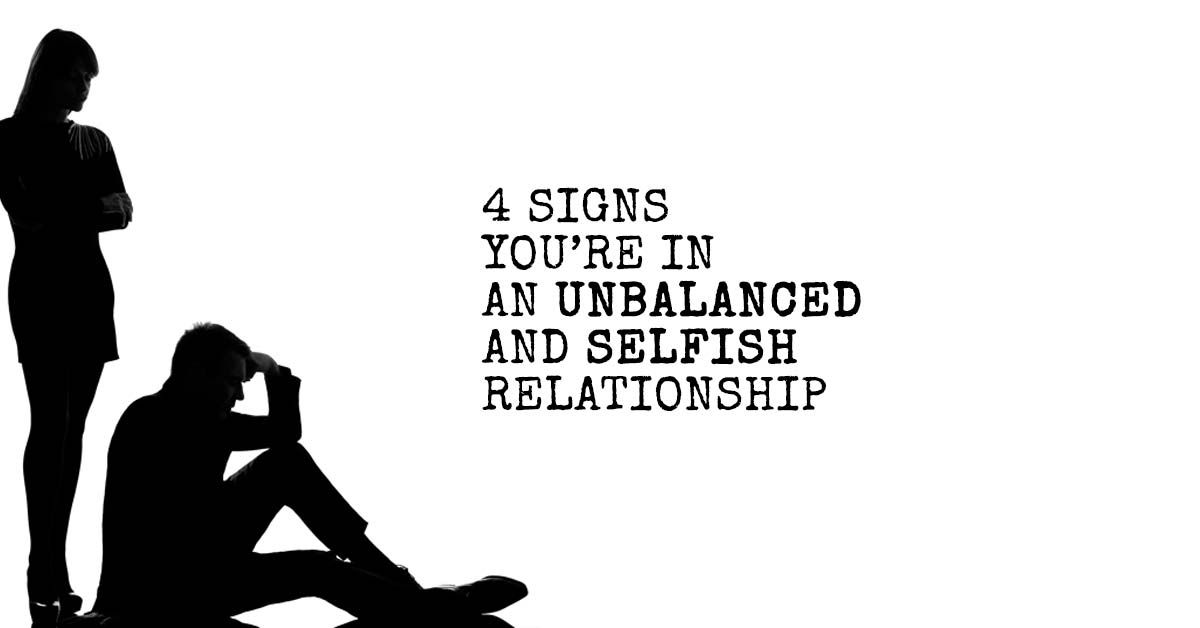
Is manipulation a common theme in your relationships? If so, McCoy recommends doing some reflection to figure out what’s going on.
“Explore past relationships and even revisit childhood and adolescent relationships,” McCoy suggests. “Were there behaviors, including manipulation, that might have seemed normal or prosocial growing up but looking back you now realize that behavior was anything but normal?”
She says those same manipulative behaviors and patterns from your past can follow you into your adult relationships.
If patterns of victimization are identified, it is important to invest in your own mental health and self-care, so that you’ll be resilient and resolute in addressing permissive behaviors in the manipulative relationship. In such a situation, it is worthwhile to seek a licensed professional for individual counselling.
Work with a professional.
Seeking help can come in the form of a licensed and trained clinical social worker, therapist, psychologist, psychotherapist, and/or psychiatrist. Don’t allow shame or fear to keep you away from the skilled professional who can guide you to resolution.
Don’t allow shame or fear to keep you away from the skilled professional who can guide you to resolution.
With the help of a pro, you (and potentially your partner, if they’re willing to do the work with you) can learn new communication tools--like using open-ended questions and non-blaming language—to improve two-way dialogue and to instill a culture of respect for each other’s ideas.
Strengthen healthy relationships.
Reconnect with a support system outside of the manipulator. Refuse to be emotionally isolated again. Envelope yourself in stable and loving relationships with family and friends. If they too have been bought into the positive image of your partner, consider reconnecting with old friends who haven’t yet met your partner. Or make new ones by taking up a hobby or sport that will allow you to interact with a different circle of people. The healthier the hobby, the better. Think, Zumba class or hiking group over mixology course or bar hopping. Physical activity that engages with nature will help you reconnect with your intuition and release pent up emotional stress.
Stay true to your gut.
“When someone you care about mistreats you, it doesn’t make sense and can feel extremely confusing,” Balestrieri says. “Many people are socialized to be kind in the face of conflict, and as such they avoid conflict or indirectly try to get their needs met.”
Stay true to your gut. Decide which course of action is best for your physical, emotional, and psychological health, whether that means advocating yourself in the relationship or walking away. Know that love and mind games do not go well together. Go boldly toward happiness.
6 Signs of Manipulation in Relationships
Are you feeling confused or guilty and not sure why? You could be sensing manipulation. Identifying the signs can help.
Emotional manipulation in relationships can be difficult to recognize.
Some manipulation tactics can be so subtle that you may end up constantly examining your own behavior rather than the other person’s.
Being on the receiving end of manipulation tactics in a relationship can have an impact on your mental health. But by learning to identify the signs, you can protect yourself and act on the situation.
But by learning to identify the signs, you can protect yourself and act on the situation.
Psychological manipulation often refers to words, omissions, and actions that attempt to control how another person feels, thinks, and behaves. This may affect their perspective of themselves, the relationship, and the world in general.
Persistent manipulation in relationships can affect your self-esteem and may cause you to experience symptoms of anxiety or depression.
Manipulation isn’t exclusive to family and romantic relationships. It can also turn up in friendships and even work-related relationships.
Manipulation can also happen on a large scale through media coverage, advertising, or political campaigns.
There are several signs to look out for that may indicate you’re experiencing manipulation in your relationship.
1. You try to ignore your gut
The first red flag may be that gut feeling that something isn’t right or that you persistently end up doing things you don’t want to.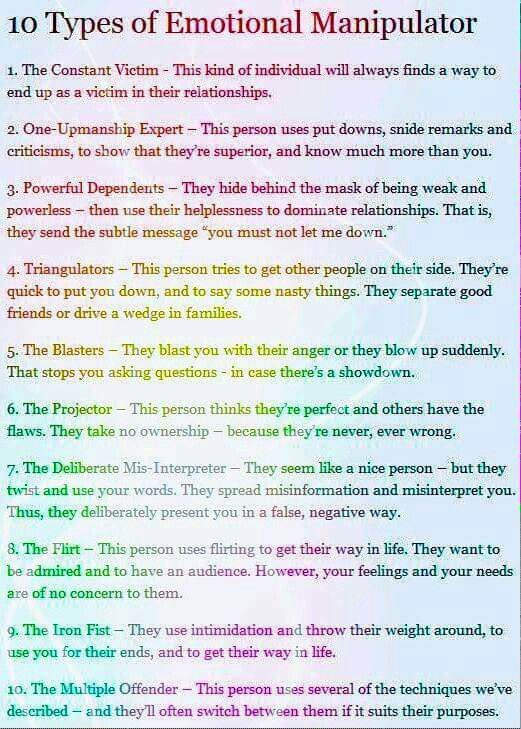 You may ignore this feeling and try to convince yourself that everything’s OK.
You may ignore this feeling and try to convince yourself that everything’s OK.
The phrase “trust your gut” is particularly useful when you think you might be experiencing manipulation.
For example, say you’re upset because it seems that your partner is always on their phone during your dates. You bring it up with them, but you notice that they get really mad, really quick.
The conversation then turns to how you seem to have ruined your special date by causing an argument. So, you forget about what you wanted to say and try to appease them instead. Meanwhile, your partner checks their phone again.
“What just happened?” you ask yourself, but brush it off because you don’t want to create more friction.
2. You wonder: Is it you?
If you’re starting to doubt yourself and your own motives, you may be on the receiving end of a manipulation tactic.
Maybe you were once confident in your ability to handle a particular situation, and now you’re beginning to question your capabilities. You may even question whether you’re “the problem” in the relationship.
You may even question whether you’re “the problem” in the relationship.
For example, you try telling your partner again how you feel about them spending so much time on their phone. But they say that you do it too and that you’re always trying to find a reason to fight.
You don’t feel this is actually the case, but after the third time you hear this argument, you wonder if the problem is you’re not letting go of the small things. Maybe you could just “chill” and enjoy the evening.
3. You feel guilty
A common sign that someone may be emotionally manipulating you may be that you’ve started to feel guilty or embarrassed for acting in certain ways in the relationship.
For example, you work two jobs and hardly have time for yourself. Then comes your first day off in months, and you decide to spend it at home, in your PJs, watching TV.
When you tell this to your mother, you notice she seems upset. When you ask her what’s wrong, she tells you she can’t believe you’re not coming to visit her on your day off. You suddenly feel so guilty that you end up spending your day helping her around her home.
You suddenly feel so guilty that you end up spending your day helping her around her home.
Although this scenario can play this way for many different reasons, it’s a red flag if you persistently feel guilty for not saying or doing what you want to.
The manipulator is expressing displeasure about something you say or do, particularly when you attempt to establish boundaries. Then, you end up giving in to make the other person happy and relieve your guilt.
4. Your sense of self is blurred
A common sign of manipulation in relationships is when you start losing a sense of who you are after following someone else’s overt or covert demands to give up your opinions and interests.
In some romantic couples, one partner may adopt the other person’s lifestyle and interests to avoid conflict, for example.
It may be that your partner persistently avoids spending time with your friends and family or doing things that you enjoy. If you want to spend time with them, you seem to have to do what they want.
In family relationships, it may be that you don’t feel you can fully express who you are as a person as well as your life choices, and you may act differently when you’re around them.
5. You walk on eggshells
Perhaps you think of fear as an intense emotion or reaction to a threat. But fear can also manifest as a hesitation to act or say certain things in order to avoid conflict or friction.
You may not even be aware of how you feel — you just automatically avoid certain topics or actions.
Some people may use anger as a manipulation tactic. Their outbursts can get other people to back off or change their behavior to avoid the reaction.
You may see this dynamic when a parent warns their child not to do something or else the other parent may get mad.
As an adult, you may also become hyperaware of your behaviors or experience signs of anxiety without a clear trigger. You could think about every decision in terms of, “What will the other person do?”
For example, you may want to go to your friend’s birthday party, but you know your partner doesn’t like them. Last time you spent time with your friend, your partner didn’t speak to you for hours.
Last time you spent time with your friend, your partner didn’t speak to you for hours.
This time, you think about it twice before accepting the invitation, anticipating that you may have to deal with your partner’s displeasure if you do.
6. You begin to question your mental health
Not only can manipulation cause stress and anxiety, but it can also make you feel confused and insecure about your behaviors and emotions.
You may begin to wonder if your reactions are symptoms of mental health conditions.
Manipulation tactics like gaslighting are most often the cause of these feelings.
For example, you’re discussing your next vacation with your partner, and they ask why you’re not considering Cancun.
You remind them that when they visited last time, they say they had a terrible time. They reply, “I never said such a thing! You imagined it.”
You’re convinced they did complain several times and said they wouldn’t return to this place. But maybe you did imagine it? After all, according to your partner, it seems to happen to you often.
When someone constantly gaslights you, you start to question your memory and well-being to the point that you’re not sure whether certain things happened at all. “Curiously” enough, it only seems to happen to you around this person.
There are different types of manipulation. Three of the most common ones are:
- Guilt induction. The person manipulating you may imply something negative has happened to you because of someone else, or or they may play on your insecurities to make you feel guilty. This includes playing the victim.
- Ingratiation. They may deliberately establish themselves in your good graces to get something from you or to get ahead.
- Deceit. They may be dishonest by misrepresenting or hiding the truth.
But manipulation in relationships can also come in other packages that may not be as straightforward or easy to identify.
Other manipulation techniques may include:
- Love-bombing.
 They may give you intense and persistent attention and affection to quickly create emotional interest and dependency.
They may give you intense and persistent attention and affection to quickly create emotional interest and dependency. - Gaslighting. They may dismiss you to make you doubt and question yourself.
- Passive-aggressive behavior. They might make sarcastic comments or jokes that can be later dismissed with “I was just joking” or “You take everything too personally.”
- Triangulation. They might bring another person into the mix to justify an opinion or make you feel insecure.
- Covert or overt threats. They may want to instill fear in you with certain comments or behaviors.
- Silent treatment. They may ignore you or cease talking to you as a form of emotional punishment.
Not everyone who manipulates is actually aware they do. They may think that’s how relationships work or even believe you manipulate them too and they need to respond.
In some instances, they may be aware of their actions but not of how they affect you.
Then, there are those who play manipulation games, knowing full well what they’re doing and what impact these actions have on others.
This doesn’t necessarily make them the “bad guy.” Instead, it may indicate that they’re living with a mental health condition that could require professional support.
Although research suggests that most people engage in some form of manipulation from time to time, people who use manipulative tactics regularly may have complex reasons for their need for control.
These reasons may include:
- having a cluster B personality disorder, such as narcissistic personality disorder (NPD) or histrionic personality disorder
- having been raised in a household where manipulation tactics were typically used
- fearing losing control or being judged
- having poor communication skills that hamper the ability to communicate needs effectively
- engaging in defense mechanisms
- having an anxious attachment style
Identifying the signs of manipulation in relationships is the first step to protecting yourself.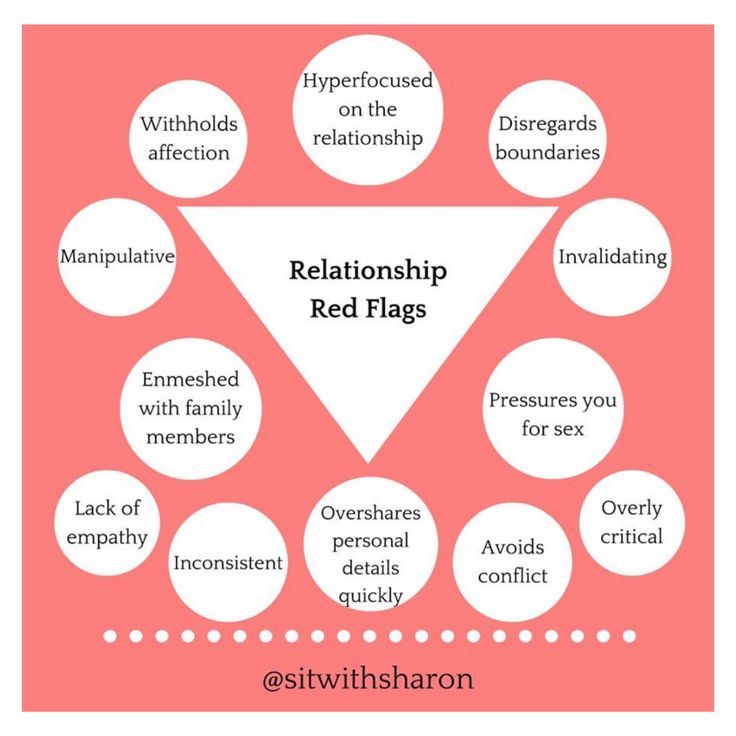 Here are some other precautions you can take:
Here are some other precautions you can take:
Be aware of your emotions as you interact with someone
Try to pay attention to how you feel around this person.
If you experience uncomfortable emotions like self-doubt, fear, or guilt, consider taking some time away from them to think clearly about what’s happening.
Keep the conversation on topic
People who use manipulation tactics often divert conversations off subject. This could be to either distract you from the real issue or to further their goal of leading the interaction.
Remaining laser-focused on the topic can help prevent the conversation from going in the direction they desire.
Establish boundaries
Unclear boundaries in relationships can make it easier for manipulation to occur. It can be helpful to identify the boundaries you’d like to establish in this relationship and work towards implementing them.
Although it’s easier to establish boundaries early in a relationship, it’s never too late to consider gently yet firmly communicating what you will or won’t tolerate.
Most people can change when they decide to do so and get the support they require for this. However, when someone’s not aware of their behaviors or they don’t have the desire to change, this transition is less likely.
This is why it’s important to focus on yourself and what you want out of the relationship. The rest may not be up to you.
Although everyone occasionally uses manipulation tactics, some people use them persistently in relationships.
Some manipulation techniques may be harder to spot, but identifying them may help you stay protected and make decisions about your relationship.
Staying in a relationship where manipulation tactics are constantly used may have a great impact on your confidence and mental health.
Change is possible, but it’s up to the other person to initiate it. This is why it’s important to focus on yourself first and come up with ways to establish clear boundaries.
10 signs that your partner is a manipulator
216,847
Man and woman
1.
 You are gradually isolated from family and friends
You are gradually isolated from family and friends — Why do you want to go to your sister? You went last week.
— She was never released from the hospital.
— I repeat: you have already visited her.
Or a milder version - from personal experience: “Well, why do you need to go to a reunion when I and I will be sad at home?” And it does work!
The time you spent without him is equal to a mortal sin. If you still go - no matter to friends or relatives, then, returning home, you find him in a bad mood and listen to caustic comments all evening.
This is very unexpected at first, and you are genuinely trying to cheer him up. In fact, your absence for the manipulator means a loss of attention, which should be entirely directed to his person, and a loss of control over you.
The ability to project is another hallmark of the narcissistic personality. If a narcissist and manipulator suddenly begins to suspect you of treason for no reason or reacts in some strange way to calls from your colleagues, it is very likely that this is the case.
2. He conveys feedback about you - and they are not always real
Gradually, certain “everyone” begins to participate in your conversations: “Everyone says that you somehow looked at me strangely yesterday”, “Everyone knows that before I was a fun guy." Rest assured, this unknown character has stuck around for a long time.
It doesn't even occur to us to check whether this "collective mind" really told something about us?
In the meantime, new characters appear: his classmates who see how he has changed after meeting you, his colleague who says that she would be happy if she had such a husband... Even your friends sometimes add something to this chorus (in his retelling).
Manipulator's favorite phrase is "It's all because of you." It is not necessarily spoken but implied
Keep in mind that in reality these people may not have said anything at all. When you ask your mutual friend directly, it may well turn out that this is the case.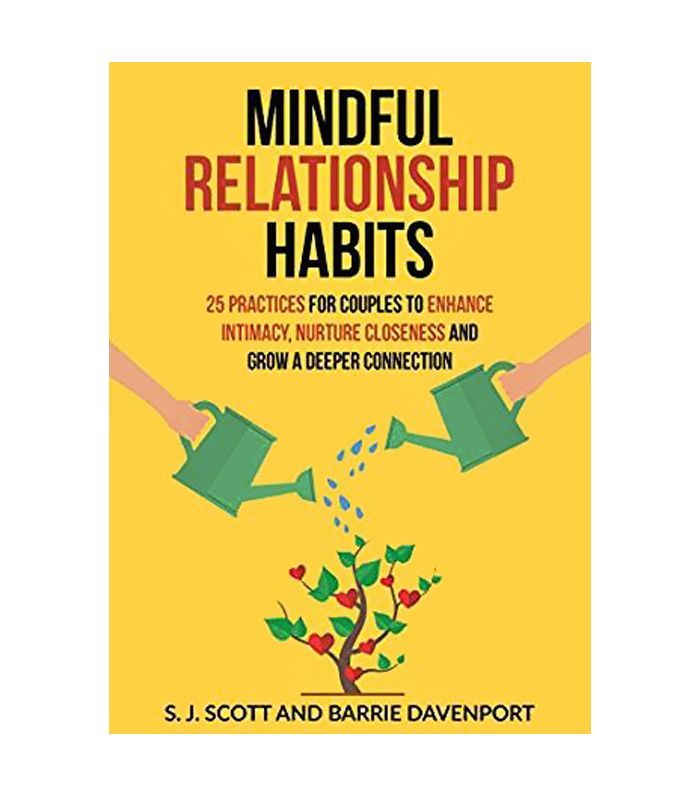 If you tell your domestic manipulator about this, you will get a great answer: “Of course no one will confess. Why did you even ask them? What nonsense."
If you tell your domestic manipulator about this, you will get a great answer: “Of course no one will confess. Why did you even ask them? What nonsense."
3. Rules are made to be followed... you
He cheated and you must forgive him. If you didn't spend so much time with your child, he wouldn't feel lonely and look for warmth and sympathy. He has needs, and you have neglected them.
If you rush to satisfy these needs, it will turn out that they are bottomless and have no specific boundaries: he needs all of you. Whatever you do, it is assumed that you have done little. Your needs will never be discussed. If you happen to smile or joke with someone, be prepared for harsh questions about your betrayal.
4. He will compete with you
You discover an amazing thing, but like any healthy person, at first you simply refuse to draw parallels between what is happening. For example, you sing well - and he suddenly interrupts you at parties and starts singing himself. You are sick and want to lie down, but in the evening he also falls ill and asks to cook him a warm broth and bring grapes.
You are sick and want to lie down, but in the evening he also falls ill and asks to cook him a warm broth and bring grapes.
The truth is that you cannot be better (greater) than your partner in anything. You started telling something to your friends, and he says: “Not like that, let me tell you”? Here is your first call.
And no jokes about his looks! Passing by a mirror, the narcissist is convinced only that he is beautiful. If he slipped and you laughed (well, after all, we are from childhood!), you will catch his frankly evil look on you for a moment and realize that you have made a mistake again.
Robert Levine
"Mechanisms of Manipulation"
In order to collect material for this book, psychologist Robert Levin had to temporarily abandon the usual life of an armchair scientist and immerse himself in the environment of those who made deception their profession.
5. He likes to complain and seek sympathy
His sister once forgot to come to his birthday. Colleagues refused to replace him when he had to leave. In general, he is surrounded by some idiots.
Colleagues refused to replace him when he had to leave. In general, he is surrounded by some idiots.
Over time, it turns out that the sister at that moment was lying with the flu, and colleagues at work had long ago exhausted the limit of patience after he let them down several times. Of course, it is impossible to live doubting everything, but frequent complaints and the manner of an unrecognized genius should alert you.
6. He wants to “improve” you
The manipulator's favorite phrase is "It's all because of you." It is not necessarily pronounced, but it is implied very often. For example: he forgot his keys because you didn't remind him. He left for the whole weekend because he got bored.
As soon as the honeymoon (or year) ends, as it happens for all couples, emotions and delights are replaced by another, calmer phase of the relationship. Everyone goes through a grinding phase, and then - attention! - the manipulator begins to slowly look for ways to "improve" you. Don't miss this moment, especially if you already have low self-esteem. It starts with harmless comments - “Oh, what a funny hat”, or “What is that speck on your face?”.
Don't miss this moment, especially if you already have low self-esteem. It starts with harmless comments - “Oh, what a funny hat”, or “What is that speck on your face?”.
Gradually you develop your own style and manner of dressing with an eye to your companion. And you get his verdict: “Yeah…”
7. All his exes are monsters
Two favorite themes of the narcissist and the covert manipulator: all his “ex” turned out to be monsters and everything that happened was their fault. He suffers a lot. But he can handle it. If you ask how this happened, a detailed story will follow, by the end of which you will want to take this kitten in your arms and protect him from this cruel world.
8. He likes to punish with silence
In any healthy relationship, everyone needs time to be alone. This is simply vital for an introvert, an extrovert can take time out for a short time to think about something or “cool down” after many hours of fun. A few minutes pass, and you are again ready to see each other and communicate, as if nothing had happened. This happens spontaneously, and the partner himself will say that he wants to be alone for a while.
This happens spontaneously, and the partner himself will say that he wants to be alone for a while.
We think we have found love and joyfully prepare to understand, forgive and support
Not so with the manipulator. He stops suddenly and for a long time and will never say why. You must guess for yourself and beg for forgiveness. Although you did not commit visible misconduct and, most likely, you did something that made him feel inferior to you in some way. Such proud silence is just one way to control you.
9. He is very courtesy, and… nothing more than that
— Please help my son with math, I'll be back late today.
— Of course, dear.
(In the evening everyone greets you in a good mood, but the lessons are not done.)
Pay attention to what your partner says - and what he does. Manipulators are often very charming and at the stage of acquaintance and "seduction" they surround you with royal care.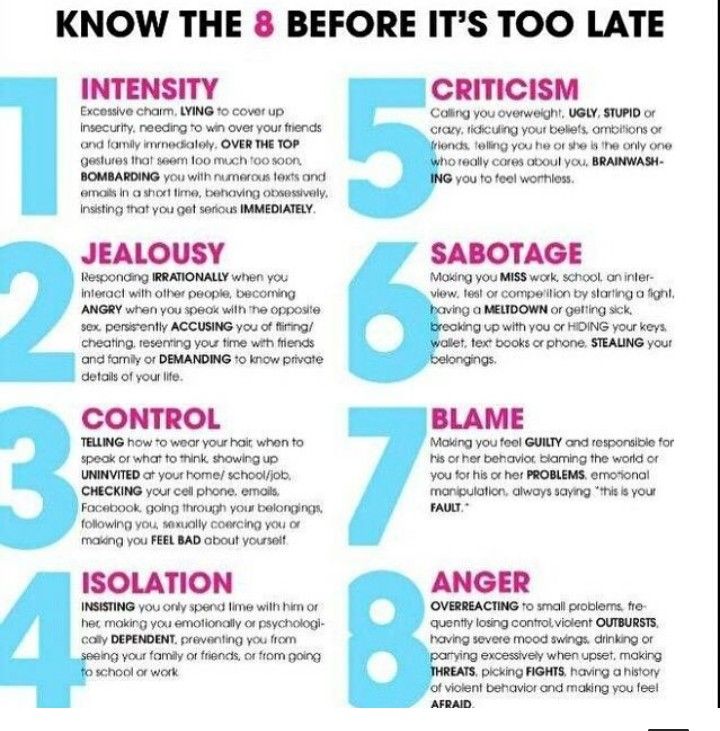 This period, unfortunately, is not long. It doesn't matter for what reason it ended - he got bored, he got everything he planned from you, he got new interests... hurry up. This is repeated dozens of times, and it does not bother him at all.
This period, unfortunately, is not long. It doesn't matter for what reason it ended - he got bored, he got everything he planned from you, he got new interests... hurry up. This is repeated dozens of times, and it does not bother him at all.
10. Disobedience will be punished
Every time you break its rules, you will be sure to be informed about it. The wounded ego of the narcissistic personality is very painful, and he will let you feel this pain to the fullest. At first it will be emotional abuse. Which is sure to be followed by reconciliation. But the general pattern is that each new blow will be stronger. In fact, this begins the transition from normal healthy relationships to relationships based on violence. From emotional to verbal abuse. From him to the physical.
How can you not notice such obvious things, you ask? You can, and it happens all the time.
We think we have found love, and we joyfully prepare to understand, forgive, and support in sorrow and joy.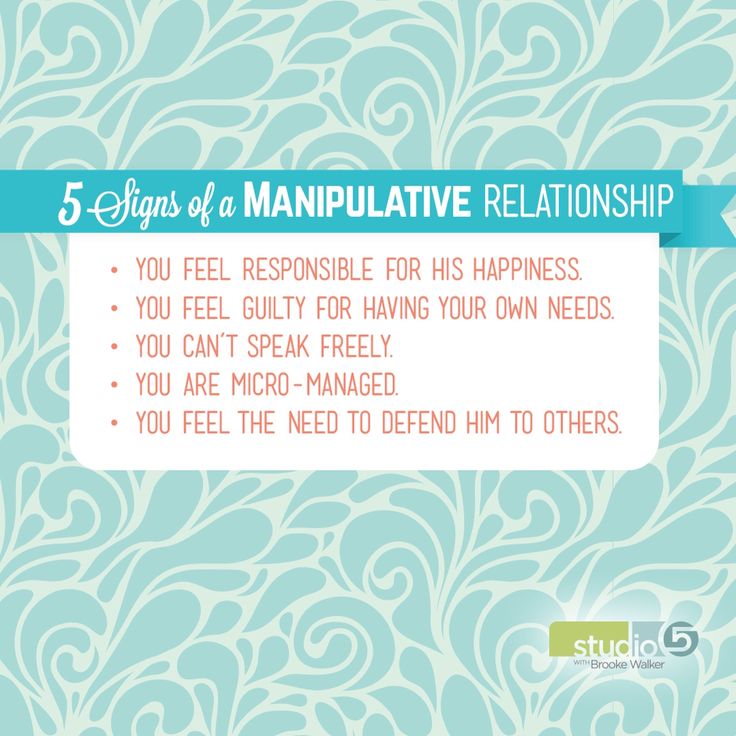 The manipulator, on the other hand, receives a human copy at its disposal, which must be unobtrusively trained to be the way it should be.
The manipulator, on the other hand, receives a human copy at its disposal, which must be unobtrusively trained to be the way it should be.
Try to pay attention to all these signs that indicate a narcissistic person prone to manipulation, even at the stage of acquaintance. After all, all that matters in the long run is your emotional health.
Text: Maria Malygina
New on the site
“I live in the animated series Gravity Falls”
14 simple and quick ways to relieve stress
How to learn time management from a child
“I want to move to another city, but I don’t want to part with my family”
“We need to talk”: 11 traps to avoid in the dialogue
“My husband almost killed my cat and is blackmailing me with a divorce. How to live with it?
Doubts about one's own sexuality: scientists have found their main cause
Silent killers of love: 8 toxic thoughts for relationships
“Prove your love to me!”: 13 signs that your partner is manipulating you in a relationship
at an early stage of dating.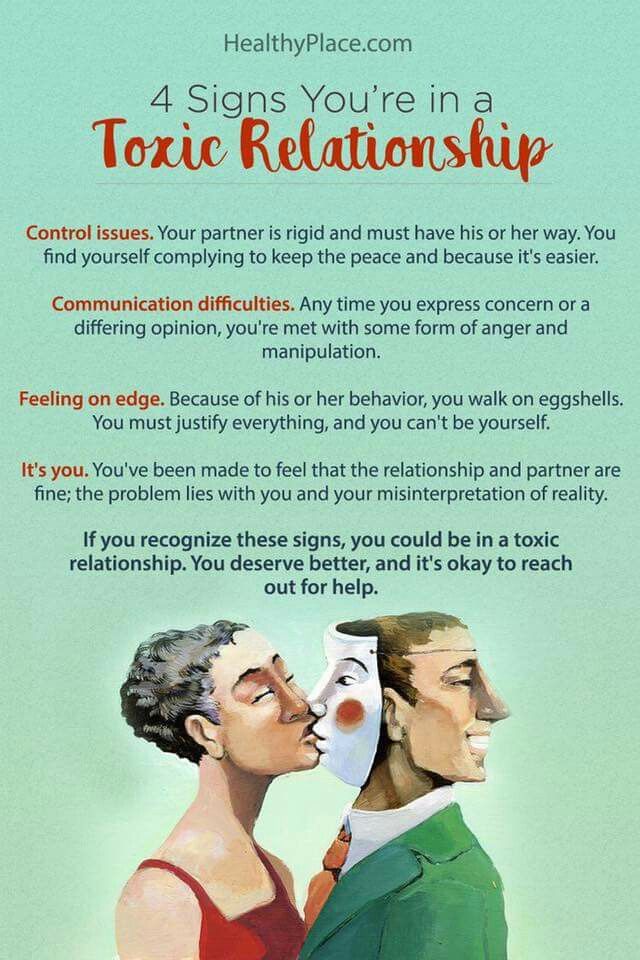 No matter how paradoxical it may sound, it is much more difficult to understand that they are trying to manipulate you in a relationship. Fortunately, there are several signs that a partner is using you and your good feelings to their advantage.
No matter how paradoxical it may sound, it is much more difficult to understand that they are trying to manipulate you in a relationship. Fortunately, there are several signs that a partner is using you and your good feelings to their advantage.
He/she crosses personal boundaries
Photo: pexels.com/ru-ru/@vera-arsic-304265
It is important to understand that no one has the right to violate your personal boundaries, even the closest people - parents, children and, including, your beloved. Of course, in a couple we build personal boundaries differently than with unfamiliar people: we can forgive a partner what we would not forgive a colleague and friend. But if you feel that you are uncomfortable with some of the words and actions of your lover, it is definitely worth discussing, and not enduring because of the fact that it is accepted in couples.
He/she does not understand the word "no"
For the manipulator, only his desire and his opinion exist.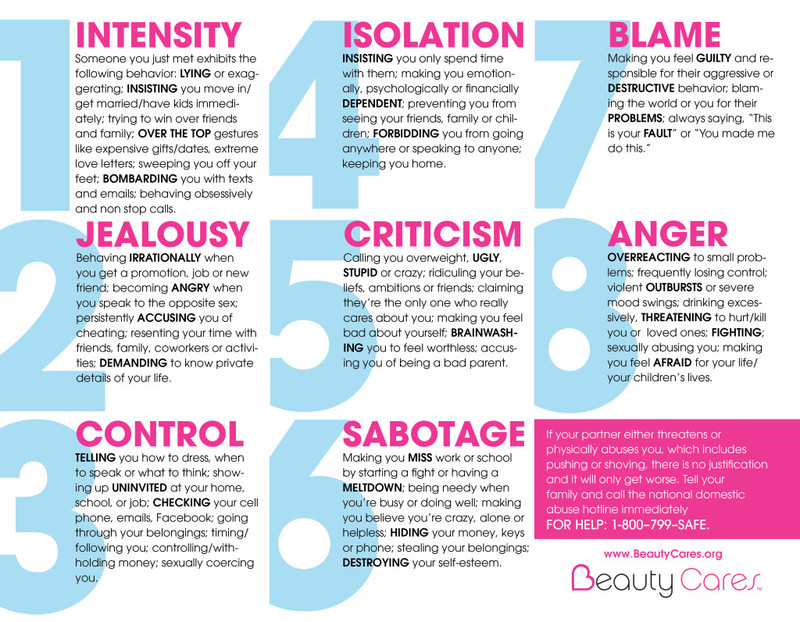 Therefore, in resolving any issues, he will focus primarily on his own interests. Most likely, you will be asked to share your thoughts about the place of the vacation or the color of the curtains in the living room, but if your desires do not match his, the manipulator will quickly discount them.
Therefore, in resolving any issues, he will focus primarily on his own interests. Most likely, you will be asked to share your thoughts about the place of the vacation or the color of the curtains in the living room, but if your desires do not match his, the manipulator will quickly discount them.
He/she uses emotional blackmail
Photo: pexels.com/ru-ru/@trinitykubassek
Any misdeed or secret that you had the imprudence to share with a manipulative partner, sooner or later he will use against you. Most often this happens in the heat of a quarrel, when you are suddenly reminded of all your past transgressions and threaten to reveal your secret to others. Trying to make a person feel fear and embarrassment is another kind of manipulation.
He/she behaves like a Drama queen
The manipulator often uses dramatic statements intended to evoke feelings of guilt and pity. “I thought you love me”, “You are the only one who understands me”, “I will die without you”. If your partner uses such emotionally colored and expressive expressions in the heat of an argument or quarrel, be sure that he is manipulating you and will definitely take advantage of your kindness if you give up.
If your partner uses such emotionally colored and expressive expressions in the heat of an argument or quarrel, be sure that he is manipulating you and will definitely take advantage of your kindness if you give up.
He/she constantly demands to prove love
Photo: East News
Manipulators are selfish, and it is important for them to constantly hear assurances that they are the best and irreplaceable. These people will use your love with all their might to force you to do what you don't want to do. “If you love me, you will leave this job”, “You love me, don't you? Then stop buying a coat so we can buy me a prefix. Such demands to make sacrifices for the sake of love are one of the most important signs that they are trying to control you.
He/she can easily burst into tears
Photo: pexels.com/ru-ru/@odonata-wellnesscenter-48563
All manipulators are very talented actors, otherwise no one would believe in their acting.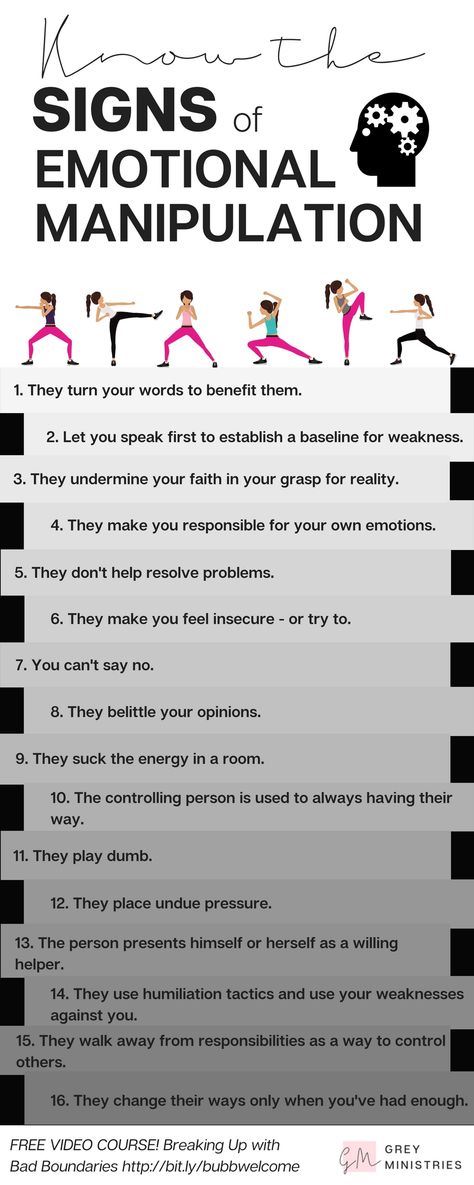 That is why for a person who is trying to arouse pity and guilt in his partner, it costs almost nothing to burst into tears. Most often this applies to women who know perfectly well that with the help of tears you can melt a man's heart, but sometimes men also sin with this mean trick.
That is why for a person who is trying to arouse pity and guilt in his partner, it costs almost nothing to burst into tears. Most often this applies to women who know perfectly well that with the help of tears you can melt a man's heart, but sometimes men also sin with this mean trick.
You are living the life of a partner
It is much easier to suppress a person if he has no one to turn to for help and support. Therefore, manipulators often seek to embroil their other half with family and friends. So the victim will devote all his attention and love only to the partner, and this is precisely what the domestic tyrant seeks.
He/she will never admit guilt
Regardless of the circumstances of the quarrel, you are always at fault. Manipulators are great at playing the victim, even if the situation was their fault. “I broke this mug because you sneezed loudly”, “I was fired from work because you do not support me”, “I got sick because you washed my socks” - such people simply do not know how to admit their mistakes and strive all shift the responsibility for them to the partner.
He/she practices gaslighting
Photo: pexels.com/ru-ru/@cottonbro
Gaslighting is an attempt to distort reality in order to make the victim feel insecure. “Actually, I never yelled at you, you just misunderstood everything,” “Of course, I warned you that mom would come, you just forgot again.” All this causes the victim to doubt himself and ultimately feel guilty.
He/she belittles you
The manipulator seeks to tie the victim to himself in all possible ways, therefore, in every possible way belittles the dignity of his partner. “Without me, you wouldn’t have coped with this,” “Well, who, besides me, needs you like that?” Over time, the victim begins to believe that only one person is needed, and will not even make an attempt to end this toxic relationship.
What is benching: how to understand that you are a “fallback option” and a partner is already looking for a replacement for you
More details
He/she often pretends to be sick
In an attempt to avoid a serious conversation, manipulators may say they are sick or even pretend to lose consciousness. The same trick is used to arouse pity in the victim so that she, in turn, immediately forgives her partner. After all, the manipulator is not able to ask for forgiveness.
The same trick is used to arouse pity in the victim so that she, in turn, immediately forgives her partner. After all, the manipulator is not able to ask for forgiveness.
He/she uses the phrase: "I was joking"
Photo: pexels.com/ru-ru/@jonathanborba
The phrase "I was joking" is one of the lowest and at the same time effective ways to manipulate. Usually it is used after they offended you, criticized, hurt you. With the help of these words, a person, firstly, relieves himself of responsibility for rude words, and secondly, again, he makes you feel guilty - you yourself are to blame for reacting so sharply to a harmless joke.
He/she makes fun of you in public
Trying to embarrass your partner in public, discussing his or her secrets with friends is another marker that you are being grossly manipulated. With the help of this trick, the abuser tries, on the one hand, to show how pathetic and worthless you are, and on the other hand, he proves that only he will be with you no matter what.

